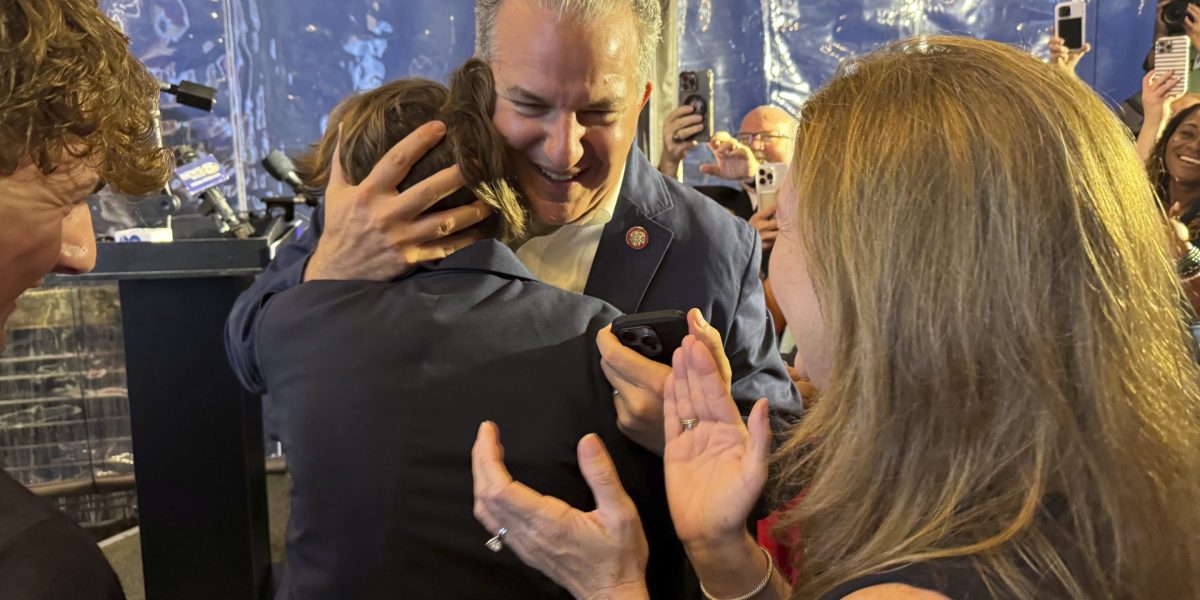Republicans Jimmy Patronis and Randy Fine won special elections Tuesday in two Florida congressional districts, bolstered by President Donald Trump’s endorsement to fill vacant seats in reliably Republican strongholds.
Patronis, the state’s chief financial officer, fended off a challenge from Democrat Gay Valimont even though she far outraised and outspent him. He will fill the northwest Florida 1st District seat vacated by former Rep. Matt Gaetz, who was chosen to be Trump’s attorney general but withdrew from consideration amid allegations of sexual misconduct, which he has denied.
In north Florida’s 6th District, Fine won against Democratic challenger Josh Weil for a seat vacated by Mike Waltz when he was tapped to become Trump’s national security adviser.
The win bolsters Republicans’ margin to 220-213 in the House of Representatives.
Special elections are often low-turnout events that can lead to surprising results. While GOP wins were widely expected in both districts — two of the most heavily Republican in the country — it’s notable that Democrats narrowed the margins considerably from November.
The races were among the first electoral tests of Trump’s new administration. The narrowing margins may signal a shift in public sentiment, driven by unusually strong enthusiasm as Democrats from across the country poured millions into the races. The opposition party hoped that backlash to the president’s overhaul of federal agencies and firing of federal workers would carve into the GOP’s margins at the polls.
Trump takes credit for the wins
Trump congratulated both candidates late Tuesday and said his endorsement helped them secure a victory.
“THE TRUMP ENDORSEMENT, AS ALWAYS, PROVED FAR GREATER THAN THE DEMOCRATS FORCES OF EVIL. CONGRATULATIONS TO AMERICA!” he said on his Truth Social platform.
At a waterfront restaurant in Pensacola, congratulatory text messages were already lighting up Patronis’ phone as early results were posted Tuesday night. Patronis worked the crowd of about 100 people, shaking hands and giving hugs, his wife Katie and two sons in tow.
“Let it be known that this election is a reminder the Florida Panhandle will forever be red, and it’ll forever be Trump country,” Patronis told his supporters. “And even their $6 million could not overcome one simple post on social media by Donald Trump.”
Fine spoke to about 100 supporters at the 2A Ranch Saloon in Ormond Beach, a barn-like building adorned with Trump decor, including cardboard cutouts of the president and a photo signed by first lady Melania Trump. Above Fine, a glowing “Trump is still my president” sign hung from the overhead balcony.
After the speech, Fine downplayed the narrowing margin, saying it was in the double digits and in a special election.
“I think it’s hard to say that’s an underperformance,” Fine said.
Weil said in a statement that the “race was closer than anyone ever imagined.”
“This result is also a warning sign to Donald Trump, Randy Fine, and the unelected oligarchs taking apart the government,” Weil said.
What do the results show?
Republicans in both districts are on track to win with narrower margins than their predecessors in every county. They also are on track to trail Trump’s 2024 share of the vote in the two congressional districts.
In the 6th Congressional District, Trump received roughly 65% of the vote in 2024, just behind the 67% Waltz received in his final House reelection bid. In Tuesday’s special election, Fine was underperforming Waltz by about 10 percentage points.
In Volusia County, Trump received 58% and Waltz received about 60% in 2024, while Fine was hovering around the 50% mark with nearly all the votes reported.
Fine, a self-described “conservative firebrand,” had faced growing pressure during the race’s final days as some Republicans publicly criticized his campaign and fundraising efforts, questioning whether this race would embarrass Republicans less than 100 days into Trump’s administration. Weil’s campaign raised an eye-popping $9 million compared to Fine’s $1 million.
National Democratic leaders attributed Weil’s fundraising success to what they characterized as widespread outrage against Trump. That outrage failed to materialize in large enough numbers to overturn the outcome, foiling Democrats’ hope to pull off a huge upset that would have buoyed their party.
The Democratic National Committee’s chair, Ken Martin, said the results showed “Democrats overperformed.” The National Republican Congressional Committee said the victories sent a message that “Americans are fired up to elect leaders who will fight for President Trump’s agenda and reject the Democrats’ failed policies,” spokesperson Mike Marinella said.
What did voters say?
Carol Vyhonsky, who drove to Fine’s election party from her home in Brevard County with a group of her friends, said she had no issues with Fine’s victory not being as strong as his predecessor’s was last year.
“The polling was looking a little iffy there for a while, but he pulled through,” Vyhonsky said. “As long as he won, that’s the important thing.”
Retired nurse Brenda Ray and her husband, Vietnam War veteran Mike Ray, made it to the polls to support Patronis earlier in the day. Brenda Ray said she didn’t know a lot about him but supported him because she believes he’ll “vote with our president.”
“That’s all we’re looking for,” she said.
Who are Fine and Patronis?
Fine was first elected to the Florida House in 2016 and ran each year as a representative until 2024 when he successfully won his election to the Florida Senate. He is known for his support of Israel and his efforts to restrict LGBTQ+ rights.
Patronis’ family founded the well-known Panama City restaurant Capt. Anderson’s, located along the Gulf of Mexico. He has been involved in Florida politics since he was in college, interning in the Florida Senate before being elected to the Florida House of Representatives in 2006. He was appointed by then-Gov. Rick Scott to become the state’s CFO in 2017 and won races to keep the Cabinet-level office in 2018 and 2022.
This story was originally featured on Fortune.com
Source link


 Entertainment8 years ago
Entertainment8 years ago
 Politics8 years ago
Politics8 years ago
 Entertainment8 years ago
Entertainment8 years ago
 Entertainment8 years ago
Entertainment8 years ago
 Tech8 years ago
Tech8 years ago
 Tech8 years ago
Tech8 years ago
 Tech8 years ago
Tech8 years ago
 Politics8 years ago
Politics8 years ago






